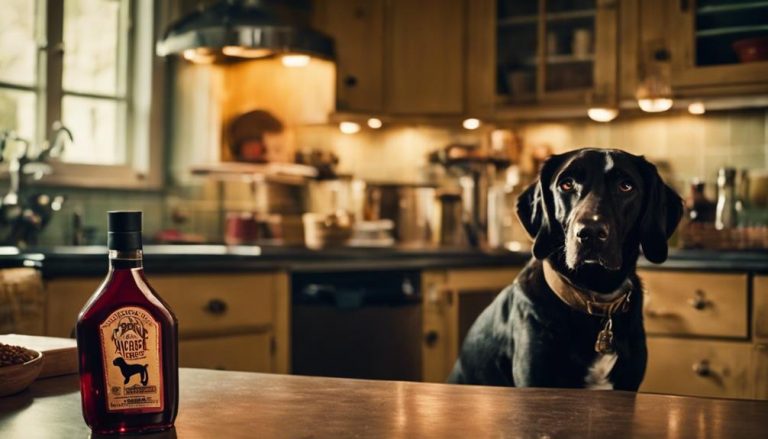Dogs and Worcestershire Sauce: Safety
Worcestershire sauce is not recommended for dogs due to its harmful ingredients such as salt, sugar, garlic, and onion. These components can cause serious health problems for dogs, including high blood pressure, heart disease, obesity, dental problems, diabetes, anemia, upset stomach, dehydration, and kidney issues. Garlic and onions are particularly toxic to dogs, leading to anemia and gastrointestinal distress.
If your dog ingests Worcestershire sauce, you may notice symptoms like vomiting, diarrhea, and discomfort. It’s crucial to get veterinary help right away in these situations. For a dog’s diet, safer options like homemade vegetable broths or low-sodium chicken broth are much better. Knowing the dangers of Worcestershire sauce helps in making smarter food choices for your pet.
Key Takeaways
- Garlic and onion in Worcestershire sauce are harmful to dogs.
- High salt may lead to dehydration and kidney problems.
- If ingested, watch for vomiting and consider a vet visit.
The Dangers of Worcestershire Sauce
Worcestershire sauce is not safe for dogs because it contains salt, sugar, garlic, and onion. These ingredients are harmful to dogs. Too much salt can lead to high blood pressure and heart disease in dogs. Sugar can cause obesity, dental issues, and diabetes, making life hard for your pet.
Garlic and onions in Worcestershire sauce are toxic to dogs. They can cause anemia and upset their stomach. If a dog eats this sauce, it might vomit. It’s best to keep Worcestershire sauce away from dogs to protect their health.
Toxic Ingredients Explained
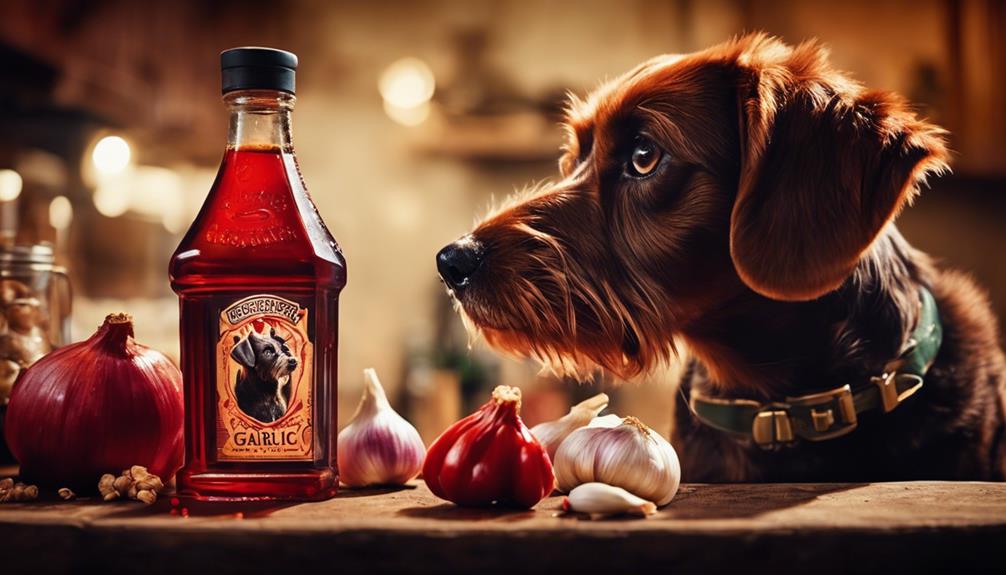
Knowing the harmful ingredients in Worcestershire sauce is key for dog owners who want to keep their pets safe and healthy. Garlic and onions, present in Worcestershire sauce, are dangerous for dogs. They can lead to anemia and serious stomach problems by harming red blood cells and causing stomach irritation.
The sauce’s high level of salt could also lead to dehydration, kidney issues, and other salt-induced health problems. While the sauce’s flavor comes from anchovies and Tamarind extract, these do not offset the dangers of the toxic ingredients. So, it’s critical to avoid giving Worcestershire sauce to your dog.
Symptoms of Ingestion
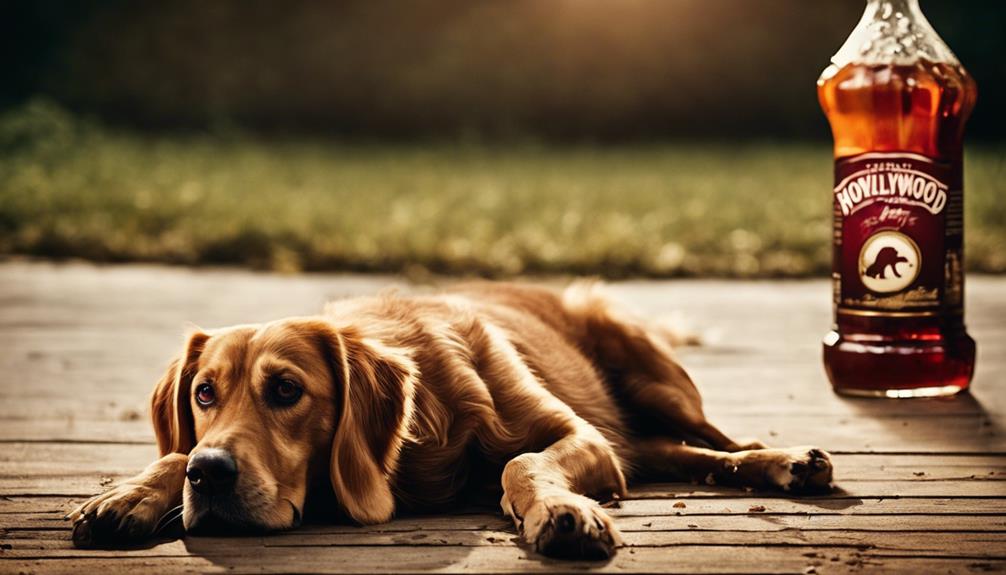
If your dog happens to consume Worcestershire sauce, there’s a chance it might start showing signs like vomiting or diarrhea. These reactions are due to the harmful ingredients in the sauce. The intensity of these symptoms can vary depending on how much of the sauce your dog ate. It’s crucial to keep an eye on your pet for any distress signals and get in touch with a vet right away to manage any health risks effectively.
The main symptoms to watch for include:
- Vomiting: This is the body’s way of trying to get rid of the toxic substances.
- Diarrhea: This occurs when the dog’s gastrointestinal tract gets irritated.
- Stomach upset and discomfort signal trouble in the digestive system.
Keeping a close eye on your dog after such an incident is important. Seeking professional advice from a vet can help ensure your pet’s safety and health.
Immediate Actions to Take

If your dog eats Worcestershire sauce, watch it closely for any upset stomach symptoms like throwing up or loose stools. It’s important to give your dog plenty of water immediately. This can help keep them hydrated and might even lessen the impact of the sauce’s high salt content, which can lead to increased blood pressure and other issues.
If your dog has had a lot of Worcestershire sauce, you should get in touch with a vet right away. Getting medical advice quickly is crucial, particularly for dogs that already have health issues that could worsen with a lot of sodium. Vets can give advice that’s specific to your dog’s needs, considering their breed, age, and size, to make sure they get the right treatment.
Safe Dog-Friendly Alternatives
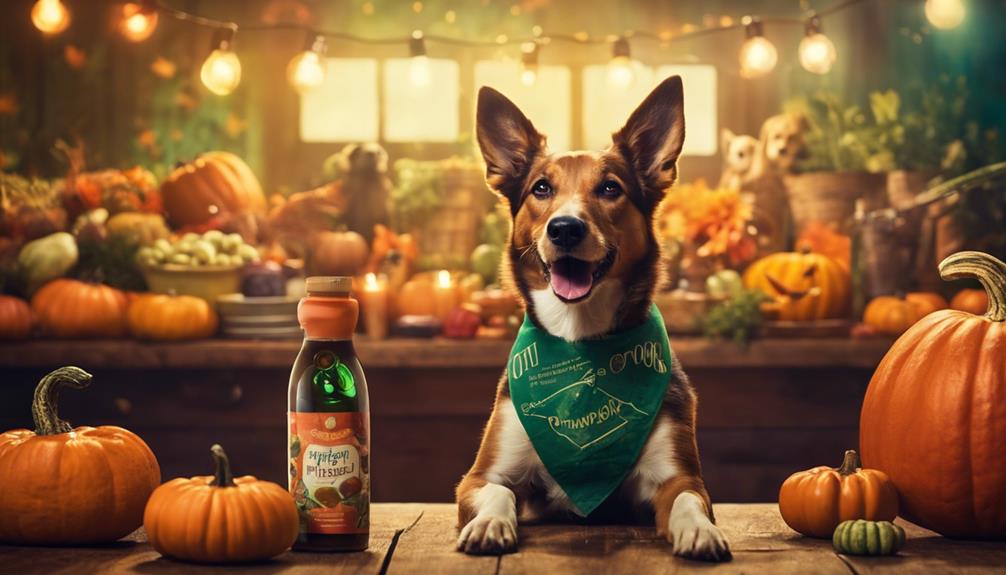
Looking for safe dog-friendly alternatives to Worcestershire sauce is key to keep our pets healthy. Homemade veggie broths, low-sodium chicken stock, and pure pumpkin puree are great choices. They don’t just add flavor but are packed with vitamins and minerals necessary for a dog’s diet.
Opting for these alternatives helps in maintaining a balanced diet for our dogs. They avoid the potential risks that come with traditional seasonings. This approach ensures our pets enjoy their meals while getting the nutrition they need.
Homemade Veggie Broths
Homemade veggie broths are a great option for dog owners looking to spice up their pet’s meals safely and nutritiously. These broths can be customized to include ingredients that are safe for dogs, steering clear of the unwanted additives found in many commercial sauces.
One of the main benefits of making your own veggie broth is the ability to control what goes into it. Choosing dog-friendly vegetables like carrots, celery, and parsley ensures that the broth is not only safe but beneficial for your pet. These broths are packed with vitamins and minerals, supporting a healthy diet. Plus, they can make any meal more appealing to your pet without compromising on health or safety.
Creating your own broth allows you to be sure about the ingredients, and it’s a straightforward way to boost your dog’s nutrition. It’s a simple step that can have a big impact, making meals more enjoyable for your pet while keeping them healthy and safe.
Low-Sodium Chicken Stock
Turning to homemade options for enhancing our dogs’ diets, low-sodium chicken stock stands out as a safer and healthier choice compared to Worcestershire sauce. This particular stock is tailored to be both safe and delicious for our pets, steering clear of risky ingredients like onions and garlic, and adding a subtle flavor that dogs love. It’s a great way to add moisture to dry food or make homemade dog snacks even more appealing.
Safety is a top priority with this stock, ensuring it’s free from additives that could harm your pet. The taste is also a major plus, offering a mild yet delicious flavor that can make any dog meal more inviting. It’s perfect for keeping our canine companions hydrated, especially when they might be reluctant to drink enough water. Whether you’re looking to soften dry kibble or make those homemade treats a bit more special, this stock is an excellent addition to your pet care toolkit.
Choosing low-sodium chicken stock without too much salt is a smart move for pet owners who prioritize their dogs’ health and enjoyment of their meals.
Pure Pumpkin Puree
Pure pumpkin puree is a great, dog-friendly option that provides numerous health benefits, including being rich in fiber and low in calories, which is perfect for a dog’s digestion and weight management. When picking food for your dog, choosing something that’s both safe and beneficial for their health is key. Here’s why pure pumpkin puree is a top choice:
Pumpkin puree is loaded with fiber, which is crucial for keeping a dog’s digestive system running smoothly. This can help with both constipation and diarrhea, making it easier for your dog to have regular, healthy bowel movements. It’s also low in calories, so it’s helpful for dogs that need to lose weight or maintain a healthy weight without feeling hungry.
It’s essential to use pure pumpkin puree without any added sugars or spices, as these can be harmful to dogs. Adding pumpkin puree to your dog’s diet can make a big difference in their overall health.
Thanksgiving Foods to Share

When including our dogs in Thanksgiving celebrations, it’s essential to choose foods that keep them healthy. Sometimes, dogs may eat something they shouldn’t during the holidays. Yet, we can share certain traditional dishes safely.
Giving your dog plain, boneless cooked turkey is a great way to share protein with them. Sweet potatoes without any added seasonings are a healthy, fiber-filled choice. Unseasoned green beans are another good option, providing essential vitamins and minerals. Pure, plain pumpkin (not the pie mix) supports their digestive health with plenty of fiber. Small amounts of unsweetened cranberries can be a delicious treat packed with antioxidants.
These choices let our dogs enjoy the holiday with us, without risking their health.
Foods to Avoid on Thanksgiving
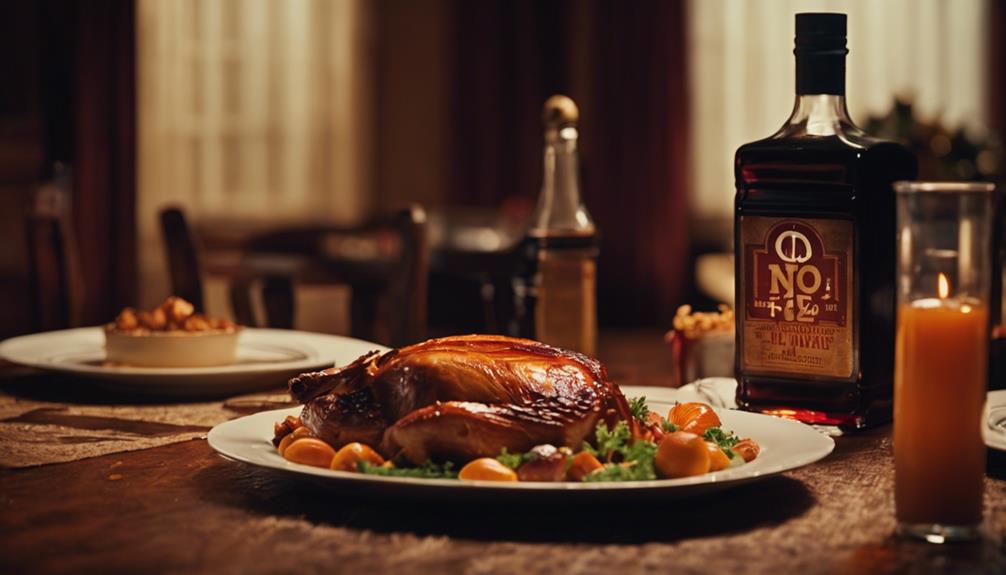
Thanksgiving is a time for joy and showing gratitude, but dog owners need to watch out for certain foods that could harm their pets. Some traditional dishes may contain ingredients that are dangerous for dogs, leading to severe health problems. Here’s what you should keep away from your canine companion:
Turkey bones and rich gravies are a no-go for dogs. These items can lead to stomach upset. Bones are especially risky as they can choke your dog or block their digestive tract.
Onions and garlic found in stuffing are poisonous to dogs, causing serious health issues if ingested. Also, avoid giving your dog desserts with chocolate or xylitol, as well as any drinks containing alcohol or caffeine. Chocolate and xylitol are highly toxic to dogs, while alcohol and caffeine can cause other serious health issues.
It’s crucial to keep these items out of reach to ensure your dog stays safe and healthy during the holiday festivities. Making sure your dog sticks to their regular diet during Thanksgiving can help prevent any emergency trips to the vet.
Preventing Accidental Ingestions
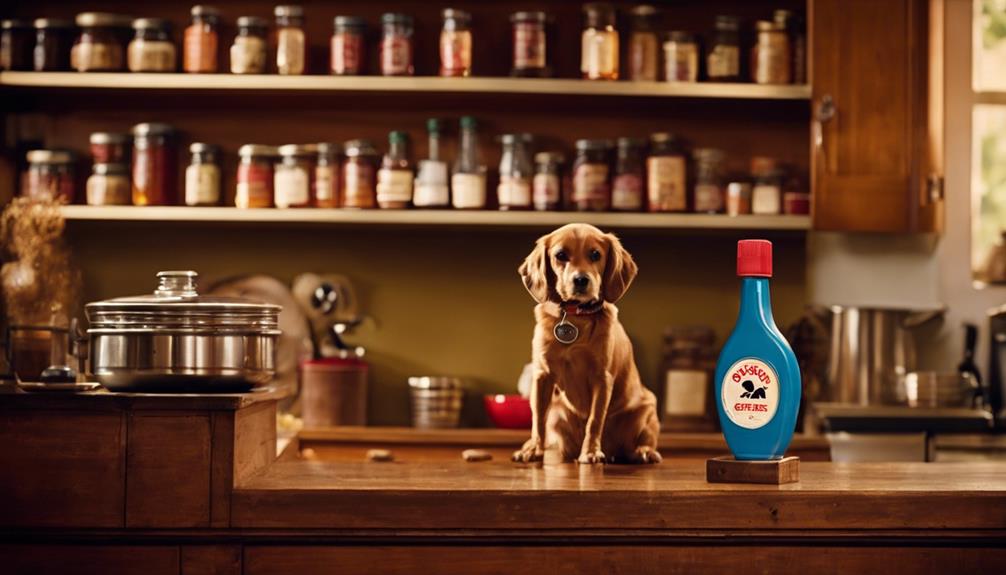
To keep dogs safe from accidentally ingesting Worcestershire sauce, it’s crucial to be aware of the ingredients that could harm them. Make sure your kitchen is secure and that anything dangerous is kept out of reach. If any spills happen, clean them up immediately to avoid any chance of your pet coming into contact with harmful substances.
Having a plan in place for quick action if your dog does eat something they shouldn’t is important for their health. Storing dangerous items safely and dealing with spills right away helps prevent accidents. If an accident happens, knowing what to do can make a big difference in keeping your pet safe.
Recognize Hazardous Ingredients
Spotting hazardous ingredients in everyday items like Worcestershire sauce is crucial for keeping dogs safe. Ingredients in this sauce can be dangerous for dogs, leading to health issues.
Garlic and onions in the sauce are harmful to dogs, potentially causing stomach upset, anemia, or more serious problems. The high salt content is another concern, as too much salt can cause symptoms like vomiting and seizures in dogs.
Being aware of these and other dangerous ingredients in foods and condiments is important for your dog’s health.
Secure Kitchen Spaces
Understanding how Worcestershire sauce can be dangerous to dogs underscores the need for kitchen safety measures. Placing Worcestershire sauce and other similar items out of reach, perhaps in cabinets or on higher shelves, significantly lowers the chances of dogs getting into harmful products. Installing safety locks on cabinets or pantry doors is a smart move to keep pets from accessing food items they shouldn’t.
Quickly wiping up any spills can prevent dogs from consuming dangerous substances off the floor or counters. Using containers that pets can’t easily open or break into adds an extra layer of protection against accidents. Being mindful of where you place Worcestershire sauce while cooking helps keep it away from curious noses and mouths, ensuring your pet stays safe.
Immediate Action Steps
When a dog eats Worcestershire sauce, quick action is critical due to its high levels of salt, sugar, and garlic, which are not safe for dogs. These ingredients can cause problems like salt poisoning, throwing up, and loose stools.
- Watch your dog closely for any unusual behavior like drinking a lot, throwing up, or acting very tired.
- Make sure your dog drinks plenty of water. This helps lower the sauce’s effects and supports the body in getting rid of harmful substances.
- If your dog ate a lot of the sauce, call a vet right away. A professional can give the right advice and treatment.
It’s also a smart move to teach people in your home and visitors about the risks to stop accidents before they happen.
Frequently Asked Questions
Is Worcestershire Sauce Safe for Dogs?
- Worcestershire sauce is toxic to dogs.
- Contains harmful garlic, onion, and salt.
- Can cause anemia, stomach problems, and heart issues.
What Condiments Are Safe for Dogs?
- Unsalted peanut butter is a healthy treat.
- Moderation in feeding is key.
- Always consult a vet before new treats.
Is It OK if My Dog Ate Soy Sauce?
- Watch your dog if they’ve eaten soy sauce.
- Small amounts are usually safe; large doses are dangerous.
- See a vet for odd behavior post-ingestion.
Is Worcestershire Sauce Safe?
- Worcestershire sauce is unsafe for dogs.
- Ingredients can cause salt toxicity and anemia.
- Best to keep it away from your pet.

